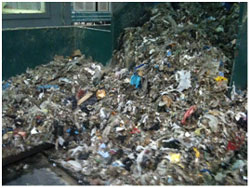An Iowa corn ethanol plant has been converted to produce commercial cellulosic biofuels from fiber and municipal waste.
 Clean technology company Fiberight announced today that it has started “commenced production at the nation’s first commercial cellulosic ethanol plant using enzymatic conversion technology and industrial / municipal solid waste (MSW) as feedstock.” According to a company release, Fiberight converted a former first generation corn ethanol plant in Blairstown, Iowa to cellulosic biofuel production. Following a total $24 million investment, the facility will be scaled to final commercial production capacity of approximately 6 million gallons of biofuel per year in 2011.
Clean technology company Fiberight announced today that it has started “commenced production at the nation’s first commercial cellulosic ethanol plant using enzymatic conversion technology and industrial / municipal solid waste (MSW) as feedstock.” According to a company release, Fiberight converted a former first generation corn ethanol plant in Blairstown, Iowa to cellulosic biofuel production. Following a total $24 million investment, the facility will be scaled to final commercial production capacity of approximately 6 million gallons of biofuel per year in 2011.
 Fiberight provides a new paradigm for environmentally sustainable waste management by offering a strong economic solution for over 60% of the trash stream, by turning it into valuable biofuel as a commercially viable alternative to traditional landfill disposal or incineration. In addition to solving a major trash disposal problem, Fiberight’s biorefineries will fulfill the U.S. Environmental Protection Agency’s mandates under the National Renewable Fuel Standard program (known as RFS2) that provides statutory requirements for the incorporation of renewable biofuel, including cellulosic ethanol, as part of the nation’s transportation fuel. For 2011, the cellulosic standard has been set for 250 million gallons (mg) increasing to 16 billion gallons (bg) by 2022. Fiberight is well positioned to support this renewable biofuel goal as reaffirmed by the Obama Administration under 40 CFR part 80 this past February.
Fiberight provides a new paradigm for environmentally sustainable waste management by offering a strong economic solution for over 60% of the trash stream, by turning it into valuable biofuel as a commercially viable alternative to traditional landfill disposal or incineration. In addition to solving a major trash disposal problem, Fiberight’s biorefineries will fulfill the U.S. Environmental Protection Agency’s mandates under the National Renewable Fuel Standard program (known as RFS2) that provides statutory requirements for the incorporation of renewable biofuel, including cellulosic ethanol, as part of the nation’s transportation fuel. For 2011, the cellulosic standard has been set for 250 million gallons (mg) increasing to 16 billion gallons (bg) by 2022. Fiberight is well positioned to support this renewable biofuel goal as reaffirmed by the Obama Administration under 40 CFR part 80 this past February.
The Blairstown facility will use initial feedstock from paper pulp wastes from a paper plant in Cedar Rapids, IA followed by integration of other industrial wastes and processed MSW from Fiberight’s operations in Lawrenceville, VA. By mid-summer, operations are projected to begin use of MSW from the Benton County municipality and other Iowa landfills. At targeted full production, the Blairstown plant will be processing over 350 tons of wastes per day into valuable biofuel, at a cost of less than $1.65 per gallon.

